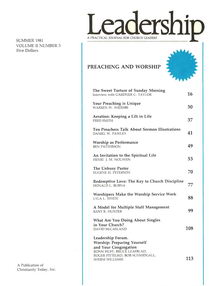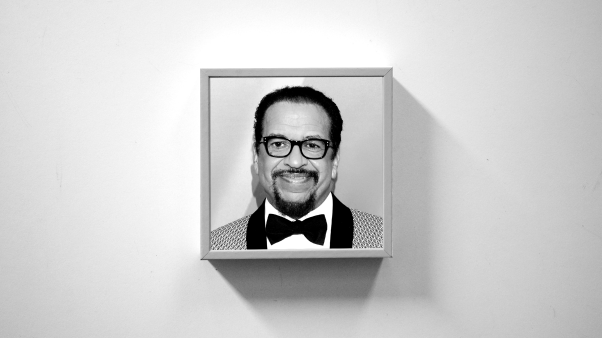There are many effective ways to do a singles ministry in a church. Too often, however, this ministry sputters, not because of the methods used, but because of a segregationist attitude the church carries toward the singles. David McCasland maintains singles must be seen as an integral part of the total church ministry instead of an isolated appendage.
Three years ago, the minister of Christian a E education in our church came to me, all smiles and enthusiasm, and said, “Listen, we have a group of single adults, ages thirty to fifty, who just completed our divorce recovery workshop. They want to start their own Sunday school class. A lot of these folks are non-Christians or new Christians, right on the hurting edge of a marital break-up, and this would be a great outreach opportunity for our church. Will you teach the class?”
It was the easiest decision of my life. I said no. I was already teaching an adult class of senior citizens who were the greatest people in the world. They loved my wife and me, thought my kids were special, and were a great source of positive reinforcement. At the time, I was teaching in a public junior high and was a little short on compliments in my daily work. I needed those nice folks at church, and they made me feel like they needed me.
But the man of the cloth persisted. “All you have to do is show up on Sunday morning and teach a lesson of biblical content that will relate to their needs. You’ll have no organizational responsibilities in the class, no counseling duties, no social functions to attend-just teach.” I paused for a moment of silent prayer-and said no again.
It was a little difficult for me to believe a group of single adults would fly this whole thing, and all I’d have to do was show up and teach. Even if that was all there was to it, I had no idea what to teach. A senior citizen in the hand seemed much less threatening than two single adults in the bush.
A couple of weeks later, the minister struck again. “We have someone waiting in the wings to run with this thing, but he can’t take it for several weeks. Will you take a leave of absence from your other class and teach this one for six weeks just to get it off the ground? We’re really up against the wall and just need a pinch hitter.” I weakened.
After six weeks of teaching the new singles class, I glanced into the wings and saw my friendly C.E. man look around, shrug his shoulders, and give the signal to keep going. That was three years ago and the music is still playing. It’s been an extraordinary experience of learning for my wife and me. We’ve been doing a lot of listening, a little bit of talking, a more than average amount of hurting, and some awed observing at the work of God in our lives and the lives of others. We’re also being ministered to by the folks we thought we came to help.
The most startling thing we’ve learned? Marrieds and singles aren’t really that different-we just think we are. We all struggle with the same basic issues of life, but we do so within slightly different contexts. Look over this list and find what you’re grappling with personally right now
¥ A sense of personal self-worth and dignity
¥ Money
¥ God’s will for your life
¥ Job satisfaction
¥ Your sexuality and how you express it
¥ The Lordship of Jesus Christ in your life
¥ Your responsibility to your parents
¥ Loneliness
There is no person, married or single, who could not check several of those items as prime issues of current importance. If we’re so much alike, then why are there often so many barriers between marrieds and singles in the church?
Perhaps one reason is that the barriers are artificial, erected through a lack of understanding of our kinship in human need. Several months ago I talked with some members of our church and one of them remarked in all love and sincerity, “We think it’s just wonderful what you’re doing for all those divorced people over there. They have such needs.” As politely and gently as I could, I said, “You know, I’m finding that their needs aren’t really so different from the ones we all experience. It’s just that they’ve been forced to be a little more honest in admitting what their needs really are.” When I shared that incident with the singles in Sunday school, all two hundred of them broke out in spontaneous applause.
At a recent class officers’ retreat, several singles spoke of their desire to move beyond the continuing emphasis on singleness and being identified only by that characteristic. A woman shared her growing realization that “one is a whole number.” A man said, “I don’t think of myself as a divorced person. I think of myself as a whole person who is divorced.” There is a difference; but it is often difficult for marrieds to relate to singles as peers, and not as persons in some kind of special category.
An article in the May 1980 edition of the Christopher News Notes entitled, “The Single Life,” said:
We are living in a family-oriented society in which couples are the norm. Singles are often stereotyped, misunderstood, or treated as outsiders. This is unfair. It discriminates against an important minority, 40 percent of the U.S. adult population, nearly fifty million people.
Let’s paint some pictures of the stereotypes that may unconsciously exist in our minds about single adults:
1. Never Marrieds. Nice people, but obviously there is something wrong with them under the surface or someone would have latched onto them long before now. They are basically unhappy, only marginally dependable, and the thing they most need in life is an introduction to the “right” person.
2. Divorced Woman. Attractive . . . very attractive. The married men wonder why any man wouldn’t be happy with her. The women think they know. She has no children, works for a TV station or an advertising agency. She is financially independent, intellectually stimulating, and sexually available.
3. Divorced Man. The whole thing was probably his fault. He has no sense of responsibility to his wife or children and is probably keeping more money for himself than he sends to his family. He is not to be trusted and spends most of his spare time with divorced women.
4. Widow. She needs our sympathy and support for about six weeks; then it’s time for her to get her act together and get on with life. If she’s young, someone nice will turn up fur her. In the meantime, she needs to really ride herd on those unruly kids of hers. Never invite her to dinner unless you invite a top-of-the-line, never-married man too.
5. Widower. His dear wife’s death was untimely; but his kids are grown, he has his job, his house is paid for, and there are a million things he can do. About six weeks of support should get him on his feet too. But he’d better not even look at another woman until his wife has been dead for at least a year.
Did you see anyone you know? Or perhaps someone you merely thought you knew? Obviously, singles cannot be categorized and labeled any more than married folks can; but we somehow find it easy to lapse into that kind of thinking about each other. Who then are those people out there whom we thought we knew?
According to a recent U.S. Department of Commerce report:
¥ In 1979, some five million families were headed by the mother alone. Nearly 600,000 were headed by the father alone.
¥ During the 1970s, one-person households increased at the rate of 706,000 per year. Such solitary dwellers are most likely to be women, but the men living alone have had the greatest percentage of increase.
The Christophers indicate that there are twenty-five million singles under thirty, and an additional fourteen million over sixty-five.
¥ Twenty-five million single adults have never married.
¥ Twenty-three million single adults are separated, divorced, or widowed; many of them are raising families under trying circumstances.
¥ Sixty percent of single adults are women.
Let me pass on some things which I believe are helpful for marrieds to realize in the process of relating to singles in the church.
1. Many people have chosen not to marry as the best course for their lives. Many others who have greatly desired marriage have accepted God’s direction thus far, which has left them without a life partner. They are moving ahead with becoming whole persons who enjoy life and make their mark on it as Christians. They need our admiration and encouragement, not our pity. Many of them feel less awkward at a dinner with other couples than they do sitting home alone. In a society conditioned to think in multiples of two, we need to realize that “odd” numbers are simply mathematical terms, not social categories of strangeness.
2. There are a great many divorced persons who tried desperately to avoid it. Divorce is not always the decision of two people. In many cases, there is one partner who wants to save the relationship and is willing to seek counseling and any other help necessary to accomplish that goal. Often, the other partner simply wants out. Even though there is always shared responsibility in any marital break-up, the will to continue often exists only in the heart of one.
In addition, the ex-spouse seldom goes away forever. Divorced people must continue to cope with painful relationships. Remarriages complicate the problem. Recently, a divorced friend of mine who has custody of his three-year-old son took him to another state and left him there for a two-week visit with his mother and her new husband. At the end of that time, the new husband brought my friend’s son back, and stayed overnight with them before returning home. Try that situation on for yourself. How would you cope with your ex-wife’s husband bringing your son back home and then spending the night in your house with you?
My friend remarked afterward that it would be nice if, when two people divorce, they could just say good-by and never see each other again. It seldom works that way, especially when children are involved. Marrieds need to understand that many singles are dealing on a continuing basis with very painful relationships.
3. We also need to realize that it takes a long time to get over the death of a spouse. A widow remarked to me that it was six months after the death of her husband before she got over being “numb.” For half a year, she went through the motions of living, accomplishing the work she needed to do, feeling nothing.
My stepmother was a widow when she married my father, a widower. Their life together was a short and love-filled three and a half years. After his death, she said, “I appreciate so much all the things the people at church will do for me, but I know it will last only for about six weeks, and then I’ll be alone again. They don’t mean to drop you, but they get back into the routine of doing things with other couples, and it never seems to occur to them to include half of a former couple in those gettogethers. It happened before and it will happen this time, but it will still hurt when it does.”
We are talking about a process of integration, and that has never been easy. The dictionary defines integrate this way: “To make into a whole; unify. To join together; unite.” Unfortunately, our integration of marrieds and singles in the church is sometimes hindered by a lack of awareness.
I grew up in a racially segregated town. As a young boy, I used to ride to downtown Oklahoma City in buses that had big letters in the back saying, “Rear Reserved For Colored, Please.” That’s a diplomat’s way of saying, “Go to the back of the bus.” It never occurred to me to wonder why black people had to sit back there. In my mind, it had nothing to do with anyone being better than anyone else. Separate seating in buses, separate schools, separate rest rooms in public buildings-that was just the way things were. As long as I was comfortable where I was, I figured they were comfortable where they were. They weren’t.
Here are some principles that we found helped achieve the integration of singles into the total church program:
1. Integrate on the basis of equality.
Marrieds should be involved in a ministry with single adults, not a ministry to and for them. Let me explain. Some time ago, I was invited to speak to a single adult Sunday school group in another city. A married man, the sponsor of the group, opened the class with a series of announcements, including one about a social event that he had planned and organized. Next, he called on another married man, a co-sponsor, to lead in prayer. Then a married woman, who was secretary of the class, came to the front and introduced the visitors. The special music was given by a visiting single who was accompanied on the piano by a married woman.
After the opening session, the class broke up into small groups, all led by married people, to discuss the morning’s lesson. The sponsor stayed in the main room to clean up around the coffee pot and refreshment area while the singles went to their classes. Not one of the single adults in that group had any type of responsibility for what was happening in their midst. They owned nothing of this ministry. The class died a slow death and is no longer in existence. The sponsor’s lament was that he was overworked trying to do things for them, and he just couldn’t seem to get them interested.
Singles, just like marrieds in the church, need guidance and leadership. But they need guidance in how to accomplish their goals, and they need at least some leadership developed from their own ranks and entrusted with their ministry.
2. Let singles choose their area of involvement in the church.
Insisting that all singles in the church attend a “singles only” class eliminates a natural opportunity for integration of singles and marrieds in mixed classes. Rigid age-and marital-status guidelines can inhibit participation by singles in the total life of the church. In our church we have two “singles only” classes. One is designated for an age group of twenty-one to thirty-five, and the other for those thirty to fifty. The age categories overlap quite a bit, but no one checks I.D.’s at the door. For those two classes, shirt, shoes, and singleness are about the only requirements.
At the same time, singles are free to attend any other adult Sunday school class in which they might feel more comfortable. In those situations, there is a diverse mix of couples and singles.
3. Encourage and facilitate genuine friendships between married couples and singles outside the formal program of the church.
As important as the church program is in promoting the unity of marrieds and singles within its fellowship, it is not enough. Outside of that structure, there is a great need for married couples to begin responding to singles as persons and friends. Margaret Clarkson writes in Christian Life (June 1980): “Few Christian couples are really aware of the singles in their midst. They tend to think almost exclusively in terms of couples and families. Singles are handy, of course, to teach Sunday school or sing in the choir, but hardly to be taken seriously as persons, as close friends, or for positions of leadership or responsibility. How little do most couples consider what their friendship could mean to a single, or what blessings they could know in their homes or churches as a result.”
Not long ago, one of our singles’ Bible study groups was planning a dinner for its members. Unfortunately, no one in the group had a home large enough to host all twenty-five people. One of the women mentioned the problem to her employer, also a member of our church. He and his wife opened their home to the group and enjoyed the dinner with them.
Both the couple and the singles told me later how much they had enjoyed that evening. The singles were pleased and a little surprised that a married couple would open their home and spend that evening with them. The couple who hosted the party was able to know personally some of “those people over there who have such great needs.” They were thrilled with the men and women of deep Christian commitment whom they met. The tragedy is that this type of interaction happens only sporadically, even in our church.
In all honesty, my wife and I would probably never have begun to reach out to the singles in our church if we had not become involved in ministry with them through their Sunday school class. But with that involvement, God has begun to pry the lid off our prejudices and has opened the doors of friendship with many special people. I continue to be amazed at their ministry of giving to us.
Recently, a woman wrote just to say thanks for the lessons on Sunday morning. A man made a beautiful wall plaque inscribed with a verse of Scripture and presented it to us. A group of men who meet each week in our home for breakfast and Bible study brought over a Thanksgiving turkey. A young woman cut flowers from her yard, gave them to us for our anniversary, and kept our children while we went away together for a day. When my father died last summer, the cards, the prayers, and the remembrances poured in from single friends.
Like all genuine friendships, ours with singles are not without pain. When a man who had hoped for a reconciliation with his ex-wife heard of her remarriage, there was not a lot to say, not a lot to do but pray and hurt with him. The sight of a close friend who shows up at class after his marriage has collapsed brings deep disappointment. We wish he wasn’t there; but he is still a friend, even when his pain spills over into our lives. When a custody fight turned ugly for another friend, the kids stayed with us for awhile, even though we couldn’t quite explain to them what was happening and why.
Our relationship with singles is neither a duty nor a martyrdom. It is a friendship, with its contradictory mixture of joy and sorrow. We are part of a body that rejoices and hurts along with its other parts. These are the simple yet profound realities of being in true community with others.
There have been many “how to” articles written about singles ministry. I suppose this would have to be classified as a “need to” article. So much needs to be done in motivating Christians to reach out to each other. There can be no successful ministry with singles until marrieds and singles begin coming together in genuine friendship relationships that serve to meet the personal needs of both.
Britton Wood, former minister of single adults at Park Cities Baptist Church in Dallas, challenged last year’s participants at the SALT I (Single Adult Leadership Training) Conference to think in terms of getting out of the single adult ministry in the future. He was not advocating the elimination of a ministry with single adults. Rather, he was saying that as churches and the members in those churches begin to minister effectively to each other as a family, the distinctions will blur between married and single adults. Real integration will take place as the people of God open themselves up to learn more from each other and interact on the basis of equality and love.
Changing the attitude of an entire congregation is a monumental, if not impossible, task. But how about changing your own mind? Is there a single person to whom you and your spouse could extend a hand of friendship? Are you willing to break out of a normal social groove to include solo people in your life? As equals? As real friends?
There will be only a few who will become involved in the formal church program of ministry with single adults. But all of us can become sensitive to the needs of people around us whom we may have falsely assumed were comfortable right where they are. We can open our homes and our hearts to individuals who will, in turn, have a special ministry to us.
One night our four-year-old daughter was in one of her reluctant moods when it came time to go to bed. She just didn’t think she could pull it off unless Mommy came up to tuck her in right then. My wife urged her to head on to bed and assured her she would be up in just a few minutes. “You have your ‘blankie’ and ‘red doggie,’ so just take them and climb into bed,” she told our small friend.
“But, Mommy,” came the reply, “I need people!”
And don’t we all?
“What’s a nice couple like you doing in a singles ministry?” I hope someone asks you that question soon, and I hope they will be encouraged by your reply.
Copyright © 1981 by the author or Christianity Today/Leadership Journal. Click here for reprint information on Leadership Journal.









